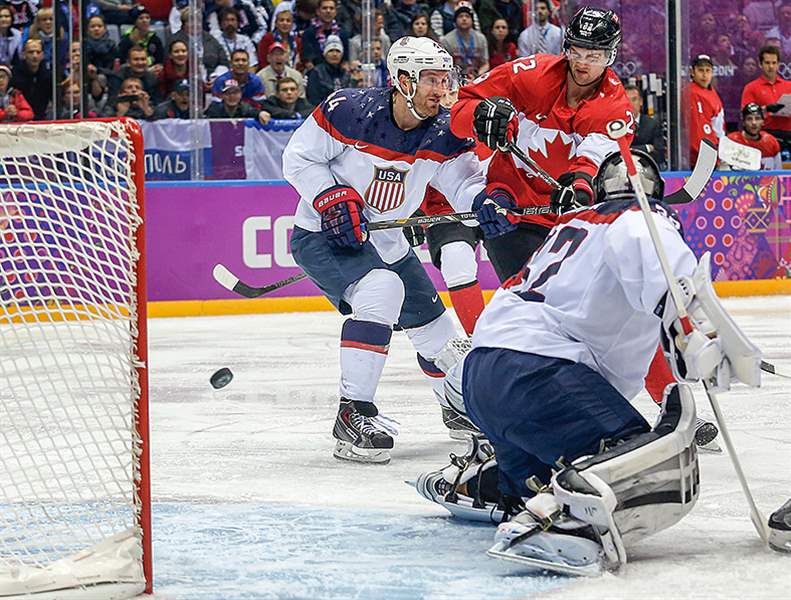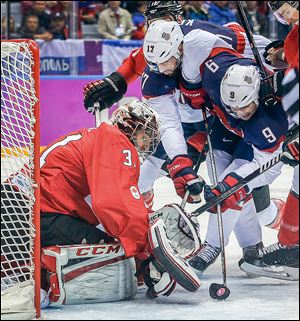
Oh, Canada: U.S. stonewalled
Americans left playing for bronze medal against Finland
2/22/2014
Canada’s Jamie Benn, right, gets his stick on the puck and deflects it past U.S. goaltender Jonathan Quick during the second period of a hockey semifinal on Friday. It was the only goal of the game.
ASSOCIATED PRESS

Canada’s Jamie Benn, right, gets his stick on the puck and deflects it past U.S. goaltender Jonathan Quick during the second period of a hockey semifinal on Friday. It was the only goal of the game.
SOCHI, Russia — Again, America was ready. Pubs were packed. Half-days were requested and understandably given. In the West, they had puck for lunch.
Say this for the intrepid young group of hockey players wearing red, white, and blue sweaters: They forced a busy nation to care.
Team USA had shown a flair for the dramatic. In 2010, they had beaten the Canadians in Vancouver and took them to overtime, coming inches away from a gold medal.
Last week at the Sochi Games, they set the year back to 1980 in all nine time zones of the Russian Federation with a shootout victory that came on the shoulders of some dude named T.J. Oshie.
Yes, put these guys up against a country with superior talent on its home ice, and a show was coming.
Friday’s semifinal against Canada was a bit different, sure. The Bolshoy Ice Dome was a neutral venue, and the atmosphere lacked the frenzy of those other big games. At times, the play on the ice seemed almost disconnected from what was happening in the stands.
For the Americans, who have lived with the bitterness of losing gold to the Canadians, finding their same emotional edge should not have been a problem.
Instead, something was missing for Team USA. Canada played angrier, as if it had spent the past 1,400 days stewing about allowing its little brother to even land a punch. The Canadians’ 1-0 victory — a Jamie Benn deflection early in the second period was the only goal — against the Americans was shocking in its efficiency.
“That was as fast of a game as I think I’ve ever been a part of,” Team USA coach Dan Bylsma said.

U.S. forwards Zach Parise, right, and Ryan Kesler try to score against Canada goaltender Carey Price during the first period on Friday. Price made 30 saves to backstop the Canadians to the win.
Bylsma was talking about the relentless barrage of skill Canada unleashed on his team for 60 minutes, but he could have been referring to the actual time.
The Canadians got it done in just a shade more than two hours and moved onto the next one. That would be Sunday’s final against Sweden, which pushed aside Finland, 2-1 — another gold-medal game for America’s bully to the north. Team USA will face Finland today for the bronze medal. By the time the puck drops, most of America will have stopped caring.
Four more years.
“Obviously it’s a sick feeling that we didn’t get the job done tonight,” Team USA forward David Backes said. “We had an awesome opportunity. I don’t think we quite laid it all on the line the way that we needed to in order to win. … They played their butts off. We played pretty hard, but another notch would have done us a lot of good.”
That statement is alarming, especially coming from a veteran like Backes.
The United States built this game up to be Canada’s talent against America’s will. Bylsma even said Thursday the Americans were “harder to play against” than the Canadians, and you couldn’t blame him for being confident of that.
The U.S. had been constructed by general manager David Poile, associate general manager Ray Shero and Bylsma to be the best American team — not the top 25 individuals. In their four victories leading into Friday, they had beaten Slovakia, Russia, Slovenia, and the Czech Republic by a combined score of 20-6, and the results had been equal parts skill and sacrifice. This was starting to feel special, all the way until it wasn’t.
Canada clogged up the middle of the ice with ease and eliminated the U.S. power play to the point that the Americans didn’t even get a shot on goal in their first attempt with the man-advantage. The Canadians played sound defense, yet also pushed the pace at a dizzying rate.
“They came at us with 20 guys,” Bylsma said. “There was a lot of speed out there. It was up and down the ice. We weren’t able to counter that. We weren’t able to match that as much as we would like.”
Still, all Bylsma’s team needed was one goal. But it just never felt like it was going to happen.
“You have to line up the moon and the stars to win,” Canada coach Mike Babcock said. “People don’t believe that in Canada, but it’s the facts. These teams are great. There’s unbelievable talent and the score is 1-0.”
At least the Canadian coach can empathize with what the Americans went through. Winning gold medals in this beast of a tournament is hard. That’s why Team USA only has two, in 1960 and 1980. Of course, it’s easier for the Canadians, who have eight, six of which came with wins against the Americans in the gold-medal game.
Now the focus turns to bronze, which would be a very encouraging mantelpiece for American hockey on the wider international ice surface. Team USA will have to do it without defenseman Paul Martin, who missed the loss to Canada because of an injury to his right hand from the quarterfinal game against the Czech Republic.
The Block News Alliance consists of The Blade and the Pittsburgh Post-Gazette. J. Brady McCollough is a reporter for the Post-Gazette.